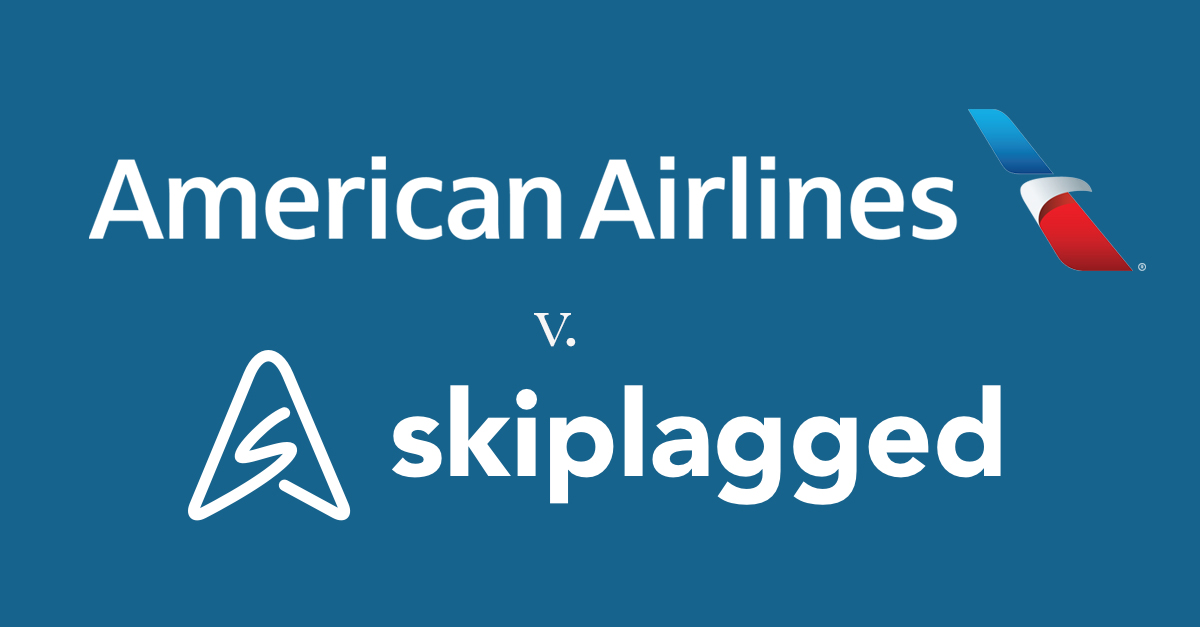
American Airlines has filed a lawsuit against Skiplagged, the online travel search engine that alerts customers to hidden city ticketing options. Unlike during the failed United Airlines lawsuit, Skiplagged is no longer just a meta search page and American’s complaint is actually not so unreasonable.
Skiplagged Faces New Lawsuit From American Airlines
First, let’s make clear our terms. Skiplagging is a term that has become synonymous for hidden city ticketing or throw-away ticketing, the idea that A-B-C is cheaper than A-B because carriers charge a premium for nonstop pricing, so you book A-B-C, walk away at B, and pocket the savings.
Here’s an example. Say you want to fly from Miami to Charlotte. American Airlines charges a premium for this nonstop flight. But add a connection to Washington and you can save a tremendous amount of money:
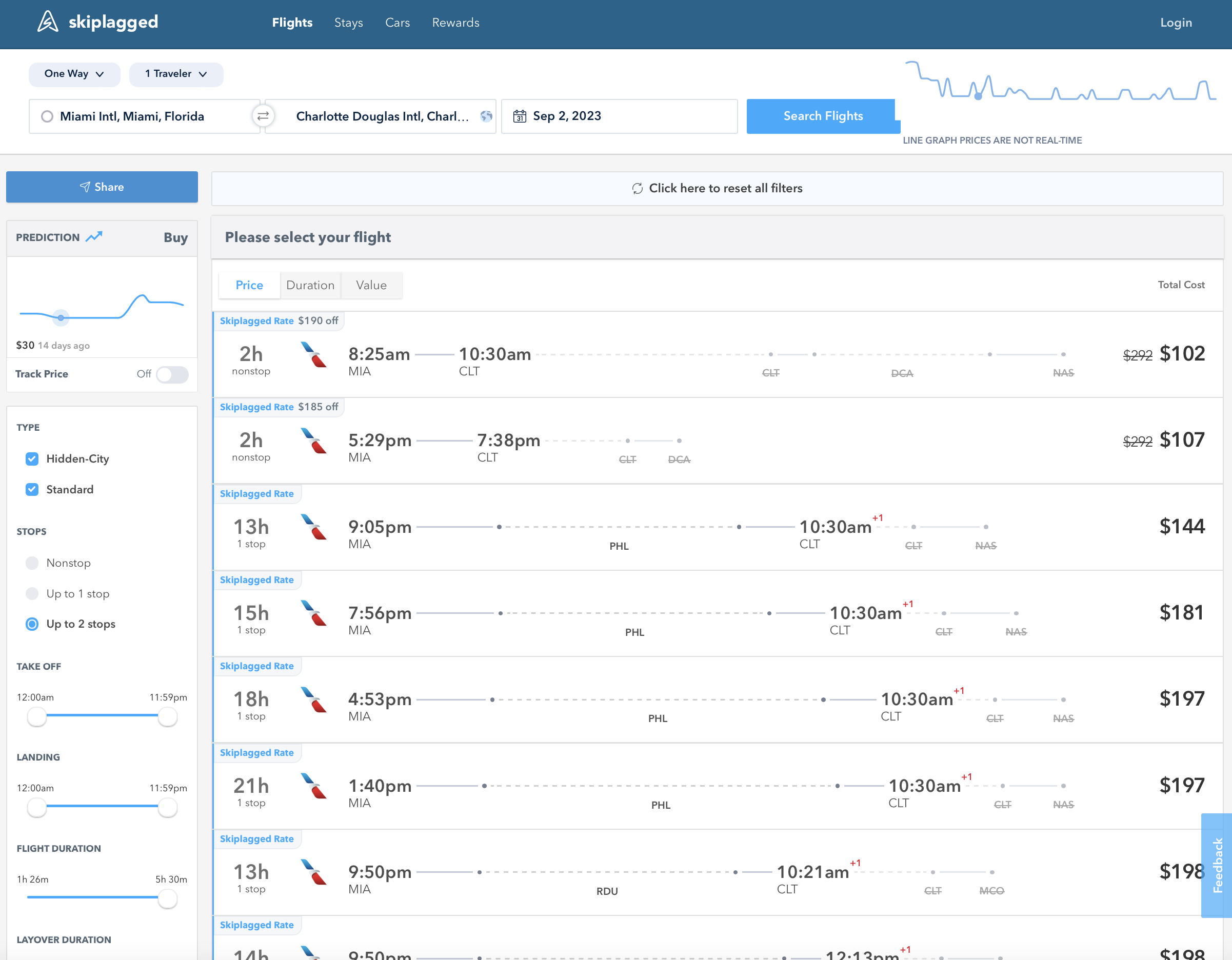
When you choose your “hidden city” ticket option, you will be presented with the following warning:
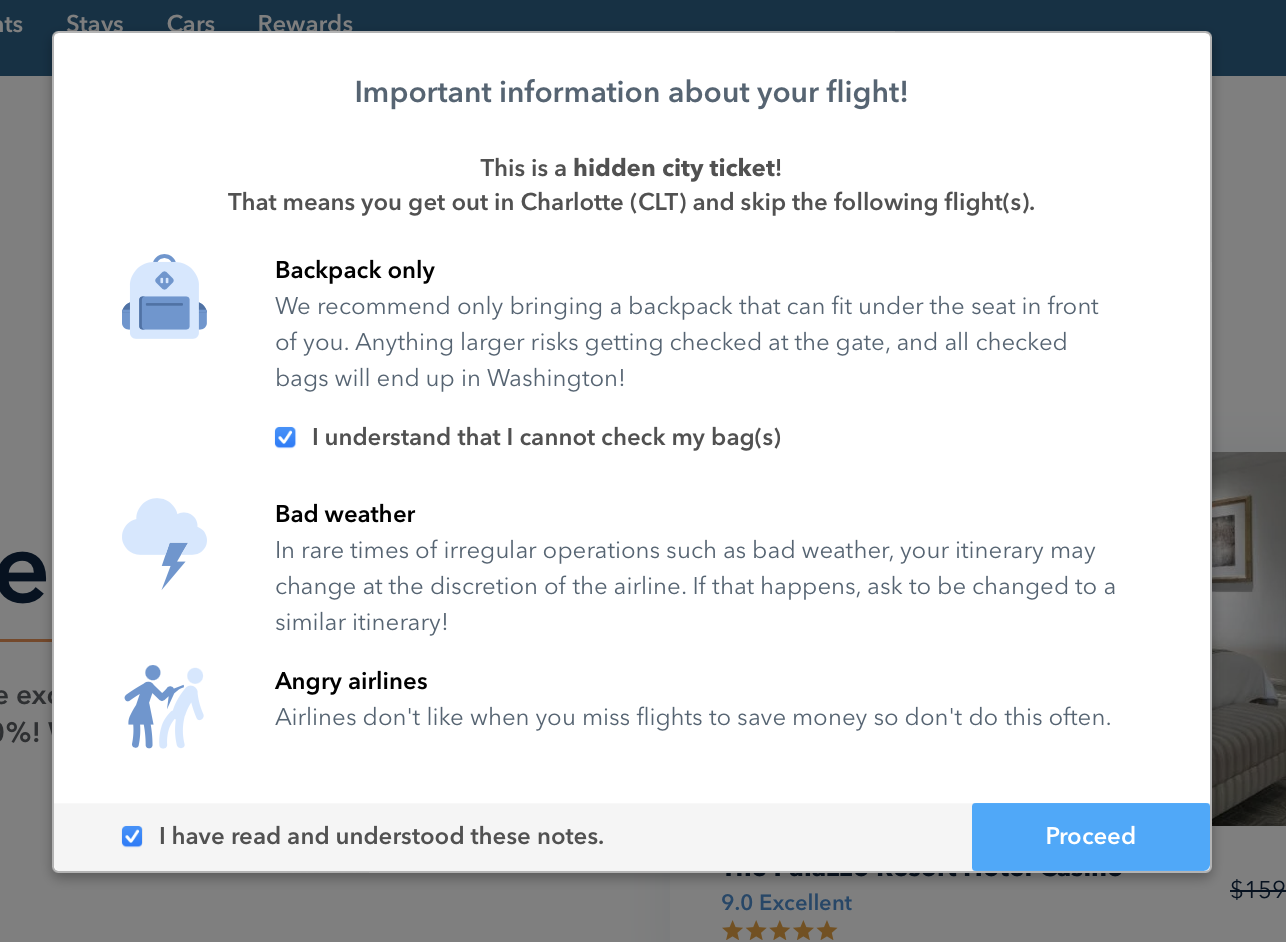
If your booking includes an international throw-away segment, your disclaimer is even longer:
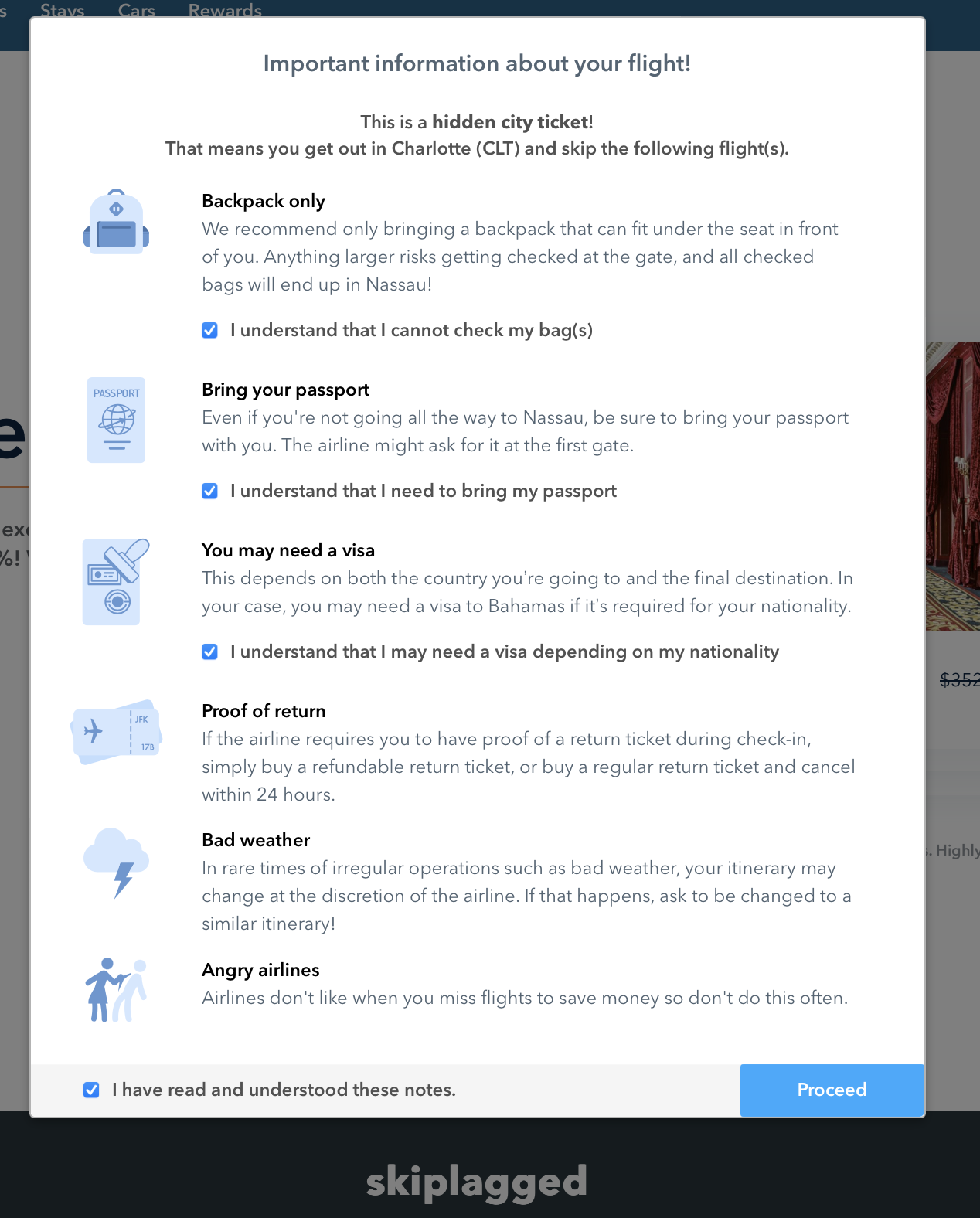
In 2015, United Airlines sued Skiplagged and lost (on jurisdictional grounds). But the Skiplagged business model has morphed from simply a meta search page like ITA Matrix in which you could not book tickets directly (deep links to airline websites or online travel agencies were available) into a page that issues tickets for a fee…a potentially huge source of revenue.
Returning to our Miami – Charlotte example, you are no longer given the option to book it yourself (though you can take the routing information and try to replicate it directly on the American Airlines website). Instead, you are only given an option to buy the ticket directly on Skiplagged. And note the 10% service fee…
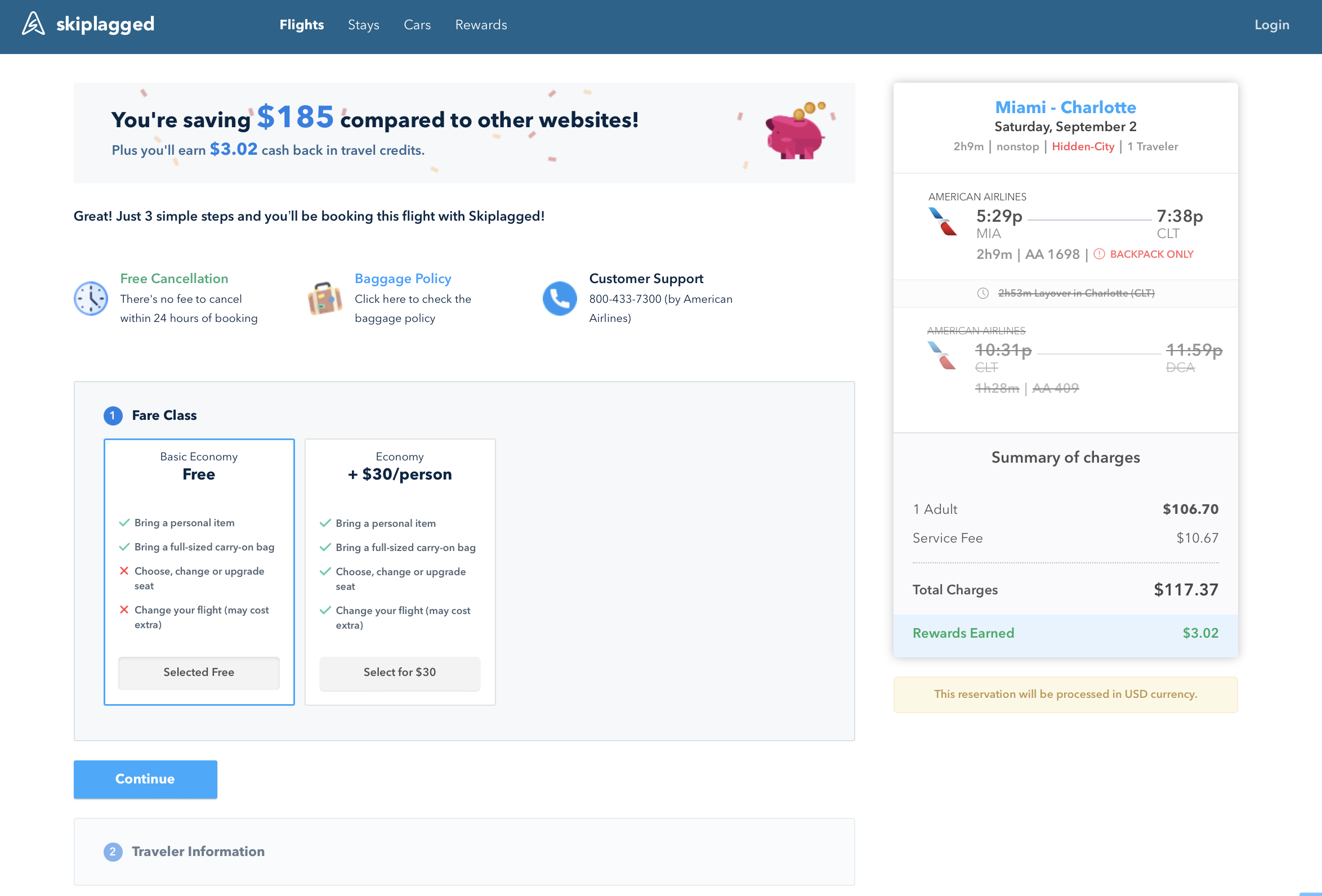
Skiplagged then completes the booking via a programmed API that purchases the ticket directly from the American Airlines website and charges the service fee as a separate line item (sometimes, tickets are purchased through scam travel agency Kiwi).
And this more recent revenue-generating innovation may be what makes the outcome of this case different than past lawsuits.
The Complaint From American Airlines
Let’s look at the complaint.
Skiplagged is not, and never has been, an authorized agent of American. It is a middle-man improperly inserting itself between American and flight consumers. It employs unauthorized and deceptive ticketing practices, entices consumers to participate in those deceptive practices by promising savings, and then doesn’t deliver. Instead, Skiplagged often charges consumers more than if they had booked a ticket directly with American or through an authorized agent of American.
This is true…you will pay more to book a ticket on Skiplagged than you do on American Airlines when the service fee is added. American Airlines sees this as a predatory and misleading to consumers (since American Airlines has been known to cancel hidden city tickets). I expect Skiplagged to aver that it makes very clear the risk to passengers at the outset.
The key here is less about the practice of “skiplagging” itself, which is not illegal, but whether the Skiplagged method of booking is suspect.
The AA lawsuit continues:
Skiplagged has never had an agency agreement with American and has never had any authority, whatsoever, to sell tickets for American flights. Indeed, Skiplagged developed methods to illegally obtain access to tickets and offer them to consumers – tickets which are at risk for immediate invalidation – because only an agent of American has the legal authority to form a valid contract between a consumer and American.
The interesting thing here is that Skiplagged is not issuing the tickets per se. It is using programming to issue the tickets directly on the AA website. So the “legal contact” for the airline ticket is between American Airlines and the consumer and the contract for the service fee is between Skiplagged and the consumer.
But American asserts that the manner in which Skiplagged books tickets on its website violates the terms of use of AA.com and therefore makes the tickets subject to cancellation.
So consumers are left with the following problem: booked via Skiplagged and your tickets are theoretically subject to cancellation. Book yourself on AA.com and Skiplagged may not survive without that stream of revenue. In the pre-Skiplagged period, finding hidden city pricing yourself (on a trial and error basis) was a lot more time-consuming.
American Airlines is also suing Skiplagged for trademark and copyright infringement, since it uses the AA logo when it diplays airfare on American Airlines. Furthermore, it is suing Skiplagged for falsely associating Skiplagged with American Airlines in cases in which a deep link is still used to bring consumers directly to the AA website to complete the booking.
You can review the complaint here.
CONLCUSION
Skiplagged is no longer a Robin Hood fighting the big bad airlines. Instead, it has used hidden city ticketing to profit and indeed done so in a manner that can confuse and deceive customers (and the Trump campaign).
I look forward to reading the response from Skiplagged, but at this point think that American Airlines has a solid chance at prevailing.



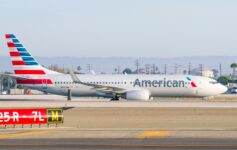
This is no more illegal than a travel agency which charges fees for services rather than traditional commission – as many high end fee based travel agents and award booking services commonly do – which have a service contract with the consumer but book fares directly between the consumer and the hotel or airline. There is no reason to believe that this is remotely illegal, and American certainly has never claimed so. Even if it was deceptive – which I don’t think it is – the damage would be sustained by the consumer and American would have no standing to assert that claim. AA has no valid claim here that I can discern.
I would say that American abusing the judicial process in this way might constitute illegal monopolization under the Clayton Antitrust Act in claiming that only “authorized agents” who agree to minimum prices it mandates can sell its tickets, and using intimidation to prevent price competition from those like Skiplagged which offer cheaper fares on those flights.
I don’t think anything is illegal here…we are talking about a civil complaint.
There is arguably deceptive practice going on here and there is trademark infringement. The problem is not the service fee (that’s how I charge for my travel consulting), but the manner in which tickets are booked and arguably the failure to properly warns consumers of the risks of booking these sorts of tickets.
Also, if AA cancels Skiplagged tickets for the manner in which Skiplagged issued them, consumers will blame American Airlines…AA has an interest in protecting its reputation, even from cunning or clueless consumers just looking to save a few bucks. This whole enterprise is based upon deception and I see the critical step as Skiplagged issuing the tickets on its website.
It’s not a lost cause for American Airlines by any means.
Skiplagged doesn’t claim to own American’s trademarks, and there is no possibility that anybody would be confused that Skiplagged is American, so there is no possible trademark violation.
If American cancels, that might be a potential issue of contract law, and perhaps Skiplagged could be liable to consumers for consequential damages, but American has no standing to assert the consumers claim which in any case doesn’t exist and the claim would be unripe and not represent a real case or controversy that would give the court jurisdiction. It’s all speculative.
A civil complaint which asserts claims for the illegitimate purpose of intimidating competitors is a well recognized monopolistic practice that could give rise to antitrust liability. American is on weak legal ground in its case, but it would be nice to see it held accountable for intimidating competitors who sell its tickets more cheaply than it does – which is basically what it’s upset about.
We’ll have to agree to disagree. Did you actually read the complaint?
The “use” element of trademark infringement is clear and the “likelihood of confusion” is not as unlikely as you suggest. You give consumers too much credit – I absolutely think the AA legal team will be able to find instances of genuine consumer confusion.
In the United Airlines lawsuit, I was 100% on the side of Skiplagged. Not this time.
I actually like Skiplagged quite a bit and have supported it for years on this blog through favorable coverage. But I think its decision to (at one point) block the hidden city destination and also to issue tickets directly upends its unassailable business model and makes it subject to more scrutiny.
Are you calling “Skiplagged” a competitor to American Airlines?
Skiplagged is evidently a competitor of AA, selling the same product that AA is selling, just for a lower price.
An element of Trademark confusion is that the defendant’s use of the mark to identify goods or services causes a likelihood of confusion. There is no confusion that a) Skiplagged is not AA and doesn’t own AA or the trademark; and b) the tickets it is selling are products of AA and not of Skiplagged. Whatever consumers might be confused about, there is no reasonable confusion which impacts the ownership of AA’s mark or the provenance of the products its selling. Skiplagged use of the AA mark to sell seats on AA’s flights is no different than 7-11’s use of Coca-Cola’s mark to sell cans of Coca-Cola. AA’s claims that consumers are misled that they are paying fees to Skiplagged is completely contradictory to its allegations that Skiplagged is misusing its trademarks.
Honestly, I never heard of Skiplagged until AA kicked that kid off of a flight a few weeks ago. Now I’m looking forward to checking it out the next time it might be relevant.
I disagree on the legal reasoning, but to your last point, indeed this media coverage and lawsuits only raise awareness of Skiplagged and make such hidden city ticketing more widespread.
And yes, the ultimate aim of American Airlines is to stamp out “competition” that undercuts its ticket prices. No doubt. That particular aim is absurd and indeed, grounds for sanction, but it is wrapped in more reasonable complaints about the specific way Skiplagged has decided to do business.
Not entirely true. Travel agents are authorized agents of AA through their affiliation with ARC and IATA, and as such must comply with their contract with AA or they will be booted and not be allowed to sell tickets for AA. The fact that some charge fees is not relevant.
Liars, cheats, scammers, and selfish assholes who feel the rules don’t apply to you. That’s life in Bullshit World, the way of the world now. Be one of them, then don’t complain about how society has turned to complete shit everywhere. Expect more of this as most people have completely lost every sense of right and wrong.
I’ll admit I have used hidden ticket before, abet rarely though and only when it made tremendous sense. I find that 95% are literal morons and sheep. Why would anyone pay skiplagged 10% to book thr ticket instead of just going directly to aa.com and putting the same itinerary in. Just like several years ago when 60 minutes or one of those shows put a security guard on a two lane road on the border fr:om New Mexico and Texas and as cars approached he stopped them and said Texas is closed today, 95% of the sheep turned around and believed it. Very few intelligent people in society.
I agree with you Matthew that AA has a strong case here. But I am still a massive fan of Skiplagged and guilty myself of using it to find a hidden city itinerary but then going to the the airlines website to actually book it. And this is me as an airline pricing analyst at one of the larger US airline… (so I hope that is putting some weight into it). I firmly believe that airlines should not be able to stop hidden city ticketing. I know from first hand that domestic airline pricing is made complicated to maximize revenue but also comes with loopholes that can be exploited.
That being said. Scamming customers is so contradictory to what Skiplagged should stand for. I think they should pivot to a subscription model. I would 100% pay for a service to find me these deals and still use the airline website to book it.
Agree with you 100%.
I am a huge Skiplagged fan too, though I do not use it for my personal bookings.
Furthermore, I’ve advised them to pivot to a subscription model before as well and would gladly pay for it…that is the better way to proceed.
https://twitter.com/LiveandLetsFly/status/1578449406218543104?s=20
If airlines would price their tickets correctly, there would be no need to skiplagg. The airlines obviously are gouging those that fly .
Every business has the right to price their products as they see fit. You have the right not to pay for it. There is no obligation for any business to discount their products to meet your expectations. This is capitalism.
I also have the right to choose which product to buy if both are available. If MiA -> charlotte -> washington is cheaper, I should be able to buy that ticket even If i don’t intend to use the whole thing. That’s a free market. Telling your customers which product they can or cannot buy is not free market.
If the grocery store puts gallon milk on sale, that it is now cheaper than the half gallon milk, How can they stop me from buying the gallon even if I only intend to use half and dump the rest. Yes that is wasteful, but that’s their fault for pricing it that way. Can that grocery store now ban me for wasting milk?
AA is full of corporate greed knowing its days are counted and keeps biting the hand that feeds…..Keeps taking away and fails to compensate unless is forced by authorities, really they should fold.
JFK/MIA to EZE//GRU/SCL its generally cheaper adding a Canadian segments on the return flight and not using it. American is about to lose, JFK or MIA its offered same or better by Delta, Latam and Aerolineas Argentinas.
Bye bye AA the end is near.